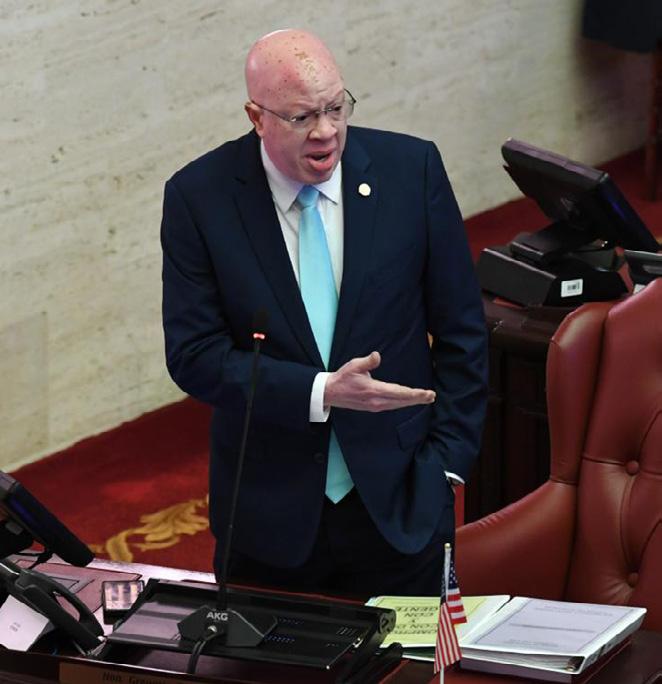
7 minute read
New York is a hellscape, Republicans say. A cabbie told them so.
By GINIA BELLAFANTE
This year, 61 million visitors are expected to come to New York City. Among the best remembered will probably be the dozen or so members of the House Judiciary Committee who traveled to 26 Federal Plaza to participate in a field-trip hearing titled “Victims of Violent Crime in Manhattan,” an event to which actual Manhattan was largely indifferent.
Advertisement
The crowd outside the building Monday morning, before the proceedings began, was small. Protesters held signs calling Jim Jordan, the Republican committee chair from Ohio and host of this theater of reproval, an “insurrectionist” and “Trump’s errand boy.” The congressman had arrived in New York to condemn what he and other Republicans view as Manhattan District Attorney Alvin Bragg’s lax approach to crime fighting, calling New York a place “where videos of violent, senseless attacks appear almost daily, and where the DA of lower Manhattan earned a reputation for caring more about the perpetrators of crime than the victims.”
Democrats were quick to describe the hearing as a “junket,” a “sham,” a “stunt,’’ a “MAGA Broadway production,” an “outrageous abuse of power” — an exercise in retribution directed at the prosecutor who indicted the former president on 34 felony counts earlier this month.
A woman outside the building where the hearing was about to get underway took out a piece of chalk, crouched down and wrote “Gym Jordan” in big letters on the street as a reminder of the congressman’s past, should anyone have forgotten. Five years ago, it was Jordan who was accused of turning a blind eye to crimes, specifically to sexual misconduct in the athletics department at Ohio State University when he was a wrestling coach there in the late 1980s and ’90s. Jordan has consistently denied the allegations, claiming he was unaware of the abuse, although a report in The New York Times suggests otherwise.
The chair, though, was quite explicit in his expression of sympathy for the victims of violent crimes brought to testify in front of the committee, among them Madeline Brame, whose son was murdered in upper Manhattan. Certain turns of phrase were repeated so often in the hearings that they might have lent themselves to a drinking game had most of this not transpired before lunchtime. Republicans referred to the “Sorosization” of the criminal justice system over and over, not intending it as a compliment, and Dan Goldman, elected to the House last year to serve downtown Manhattan and Brownstone Brooklyn, pointed to the antisemitic overtones.
For roughly four hours, the hearing played out as a fusillade of statistics, impressions and misimpressions, as Republicans argued that New York was a hellscape of unchecked violence and chaos — viral videos of which were shown on local news programs around the country to prove it. Democrats on the committee countered that things were much worse in so many other places, especially in the cities and states from which their political adversaries had come. A Republican out-of-towner proved that he had already internalized the reflexes of a certain kind of New Yorker, whether he could appreciate it or not, when he mentioned the cabdriver he had interrogated, after landing, about how much he worried about crime.
The New York Police Department, like the police departments of many other cities around the country, offers the public a weekly account of crime both citywide and by precinct, which might have obviated the need for a lot of the bickering. But then where would the drama have come from? The data tells us that so far this year, murder is down 6.6% citywide and shootings are down 23% compared with last year.
Still, is the vibe of the city more lawless than it has ever been? Robert Holden, a Democrat and a City Council member representing a district in Queens — which, it ought to be noted, is not in Manhattan — and the only elected official of local government asked to testify, said that yes, it did feel more lawless. His wife, who is Asian American, was afraid to take the subway, fearful of hate crime. She is justified in this worry. Although hate crimes have fallen 40% citywide compared with the same period last year, in Queens, where Bragg has no jurisdiction, they have gone up.
Nicole Malliotakis, the Republican congresswoman from Staten Island, where major crimes have increased this year, showed up about 2 1/2 hours into the hearing to observe and offer herself to reporters. In the overflow room outside the hearing, she talked about the dangers delivered to the world by reform-minded prosecutors, claiming that 1 in every 67 New Yorkers was a crime victim. Asked whether this hearing would have been conducted had there been no Trump indictment, Malliotakis insisted it would have, adding, “This is an issue I have been pushing.”
Unlike Marjorie Taylor Greene, the celebrity congresswoman who visited New York from Georgia not long ago and called the city “repulsive,” “filthy” and “disgusting,” Republican committee members practiced their best guest etiquette, referring to the city as an “iconic” place, a “great” place. Matt Gaetz, the Florida Republican, who did not look like someone in any rush to jump back to Washington on the Acela, said that he had not come to “criticize any New Yorkers,” that a city rightly celebrated for its drive and “hustle” was now imperiled by rampant fear.
Would Republicans, they were repeatedly asked, then agree to stricter gun control to keep illegal weapons out of the city? How the House Judiciary Committee would “save” Manhattan from itself — from the Democrats whom those who live there chose to elect — was not obvious.
Por El Star Staff
EL CAPITOLIO – El Senado de Puerto Rico avaló, durante los trabajos de la quinta sesión ordinaria, varias medidas de justicia social entre ellas el segundo Informe de Conferencia del Proyecto del Senado 537 que propone establecer la Ley para la Prevención del Maltrato, Preservación de la Unidad Familiar y para la Seguridad, Bienestar y Protección de los Menores.
Dicha pieza legislativa contó con 14 votos a favor y 11 en contra, la misma busca garantizar el cumplimiento con las partes B y E del Título IV de la Ley del Seguro Social, según enmendada por la Family First Prevention Services Act; derogar la Ley para la Seguridad, Bienestar y Protección de Menores y para otros fines relacionados.
“Esta legislación fomenta el proveer oportunidades y esfuerzos razonables que permitan preservar los vínculos familiares y comunitarios en la medida que no se perjudique al menor, evitando el trauma de la separación innecesaria de los padres e hijos. La política pública se enfoca en brindar los servicios y realizar esfuerzos razonables para evitar remociones, mantener la unidad familiar o reunificar al menor con su familia”, detalla el proyecto.
La Ley también implementará un “procedimiento estándar para el manejo de acciones judiciales de me- nores extranjeros que no ostentan el estado migratorio de residentes permanentes para alinear estas prácticas con los nuevos requisitos federales”.
Asimismo, se aprobó el Proyecto del Senado 839 de la autoría del senador novoprogresista, Gregorio Matías Rosario, que busca añadir un inciso a la Ley Orgánica del Departamento del Trabajo y Recursos Humanos de Puerto Rico a los fines de incluir entre sus poderes y deberes la facultad para identificar y crear las herramientas que permitan a las personas diagnosticadas con el Trastorno del Espectro del Autismo o Síndrome Down poder insertarse y mantenerse en la fuerza laboral. También, busca enmendar el Código de Rentas Internas de Puerto Rico de 2011 a los fines de establecer una deducción contributiva a los patronos de empresas privadas que empleen a personas diagnosticadas con el Trastorno del Espectro del Autismo o Síndrome Down.

Según la exposición de motivos de la pieza legislativa “el panorama sigue siendo desalentador, con uno de cada tres adultos con autismo que no han tenido un trabajo remunerado o educación posterior a la escuela superior. Ese porcentaje de personas excluidas del mundo laboral es más alto que en el caso de otras discapacidades. Ello es incluso peor para individuos provenientes de familias con bajos ingresos”.
Durante su turno, Matías Rosario expresó que “este proyecto es uno de justicia y lo que busca son herra- mientas para insertar en el mundo laboral a la comunidad con autismo y con síndrome Down… aquí hay un proyecto donde dice que vamos a darle un incentivo a los que contraten a las personas de la comunidad de autismo y síndrome Down, personas vulnerables y la Junta de Supervisión Fiscal hace unos cálculos que puede ser de $2 a $5 millones y por eso ellos no le van a dar paso… [Pero ellos, la Junta] ya han gastado sobre dos millones de dólares en asesores… No vamos a dejar que la insensibilidad de ellos nos arrope a nosotros y vamos a luchar por los más vulnerables”.
Por Cybernews
S AN JUAN – La directora ejecutiva de la Oficina de Innovación y Servicios de Tecnología (PRITS), Nannette Martínez Ortiz, aseguró el lunes que se mantendrá en la posición, a pesar del informe nega- tivo de la Comisión de Nombramientos del Senado.

“No voy a especular sobre las teorías de qué puede ser la razón que puede haber detrás de una recomendación o rechazo de mi nombramiento. Yo sí puedo decirle lo que yo veo”, dijo Martínez Ortiz en conferencia de prensa.
“Yo veo a una mujer trabajando en esta oficina, echándola hacia adelante, desde hace dos años y cuatro meses. Y veo a que está detrás de todos los esfuerzos como el Vacu ID, las últimas 5 o 6 actualizaciones del CESCO Digital, la arquitectura del sistema ideal que integra las bases de datos del gobierno. El sistema que vieron en el huracán Fiona para datos de emergencia, el sistema centralizado de convocatorias. Una mujer que está haciendo cambios que han sacudido el gobierno”, añadió.
A preguntas de si pedirá al gobernador que retire su nombramiento o si está dispuesta a ser colgada por el Senado, Martínez Ortiz contestó que “yo voy a continuar con el trabajo, siempre que me lo permitan y el Senado que haga el suyo. No es mi intención (pe- dir que se retire el nombramiento), será discreción del gobernador como él lo quiera manejar”.
El presidente del Senado, José Luis Dalmau Santiago ha expresado en repetidas ocasiones que Martínez Ortiz no tiene los votos para ser confirmada. Según el informe negativo de la Comisión de Nombramientos que Dalmau Santiago preside, hay dudas con relación a contratos otorgados y las cuantías que se han desembolsado en los últimos años. Además, se le adjudica falta de efectividad y eficiencia en la puesta en vigor del marbete electrónico que se anunció desde el 2022 y todavía no arranca. Asimismo, se le adscribe responsabilidad por los ataques cibernéticos a varias páginas del gobierno, que incluye la del Senado.
“Ante la falta de información clara y certera sobre el manejo de la dependencia pública y de lo anteriormente señalado, incluyendo lo relacionado con las entidades receptoras de los recursos públicos para la prestación de servicios contratados, no es posible dar paso a la confirmación de la designada”, según el informe.
The San Juan Daily Star
Tuesday, April 25, 2023 17










